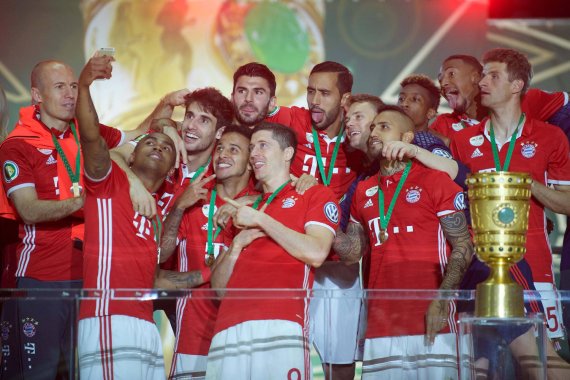
Stefan Mennerich has been authorized signatory and Director of Media, Digital and Communications at FC Bayern München since July 1. The 48-year-old reports directly to CEO Karl-Heinz Rummenigge. Under his direction, new services are being created that focus on reaching fans worldwide even better.
In an interview with ISPO.com, Stefan Mennerich explains why FC Bayern has its own editorial offices overseas and in the Far East, why FC Bayern also operates a Bavarian website, why the Allianz Arena has its own data center, and what the soccer industry leader can learn from startups.
ISPO.com: Mr. Mennerich, you will be appearing on the ISPO Panel at the start-up trade fair Bits & Pretzels. What can the big, strong FC Bayern learn from small startups?
Stefan Mennerich: We can learn a lot from startups about technology, how digital markets work, and when digital applications become successful. Being in an exchange with startups is like putting your ear to the tracks and listening to what's coming. All ideas may not work out, but some will become relevant and catch on. We can learn a lot from this innovative power.
Also in terms of agility, flexibility and also fault tolerance. Making mistakes must be allowed, otherwise no progress will be made. That's another thing we can learn from startups, and much of it has also been incorporated into our new Digital 4.0 strategy.
FC Bayern Digital 4.0: Own data center in the Allianz Arena
What is behind FC Bayern 4.0?
FC Bayern Digital 4.0 is the name of our digital transformation. In terms of its IT infrastructure and digital infrastructure, we have turned FC Bayern completely inside out over the past 18 months. The goal was for us to smooth out our entire IT systems across the entire club, so that we no longer operate with 54 systems that were incompatible, as we did in the past, but instead work homogenized on one platform - and that is SAP. Together with our main sponsor Deutsche Telekom, we have even built our own data center in the Allianz Arena.
How big can you imagine that to be?
It's our own building with its own cooling system, its own power supply, its own emergency power, its own backup supply. All the software and all the front ends are hosted on this data center, from the entire website to the mobile apps and the e-commerce store, plus all FC Bayern's business systems.
We have completely rebuilt the digital FC Bayern with the goal of having the steering wheel in our own hands, having all user data with us, having all applications with us, being completely independent of third parties.
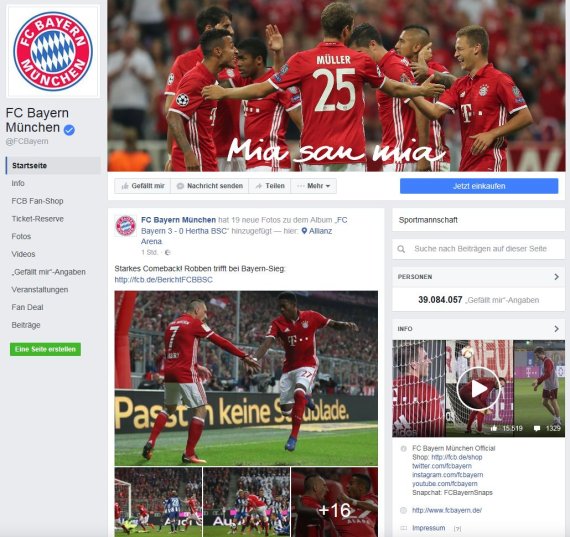
That costs at least the salary of a seasoned professional player.
(smiles) Our partners, Telekom for the data center and SAP for the entire software infrastructure, have helped us a lot. But yes, we spent money on the front ends, the web applications - because we think it's essential for our future. An investment in the future.
Merchandising and sponsoring benefit from digitization
And you need to recoup this money quickly?
No, that's not the first priority. We invested because we know that digitization is the best way to digitally transport FC Bayern, which is based in Bavaria and has local roots, to the world. In this way, we can offer our fans the best possible user experience and transport our brand worldwide. In this way, we can win even more fans worldwide and retain their loyalty in the long term. Therefore, digitization is without alternative.
In the second step, we will hopefully also benefit financially: The more fans we have worldwide and the stronger their ties to FC Bayern, the more merchandising will benefit, the better sponsorship will succeed worldwide, and the sale of media rights will also benefit - but as I said, that is only the second step.
The return on investment doesn't have an annual plan?
Definitely not. After all, the alternative would be: not having a functioning website, not having a digital strategy. And since this is not an alternative, we were happy to take this step and then did so consistently.
Why FC Bayern compares itself to an antelope
We still want to talk about expectations, about revenues.
What I can say: Already today, 30 to 40 percent of our sponsorship revenues come from digital. And 50 percent of our end-customer revenues in merchandising come via digital. All of this has already grown enormously in recent years and will continue to grow strongly - but it has to be state of the art.
Bayern fans, like other users, expect high quality in digital, and we have to cater to that. I like to call this digital Darwinism: The antelope has to get up in the morning and run! And if it doesn't, it gets caught and eaten. FC Bayern has to run every day - otherwise, at some point, you'll no longer be in the game.
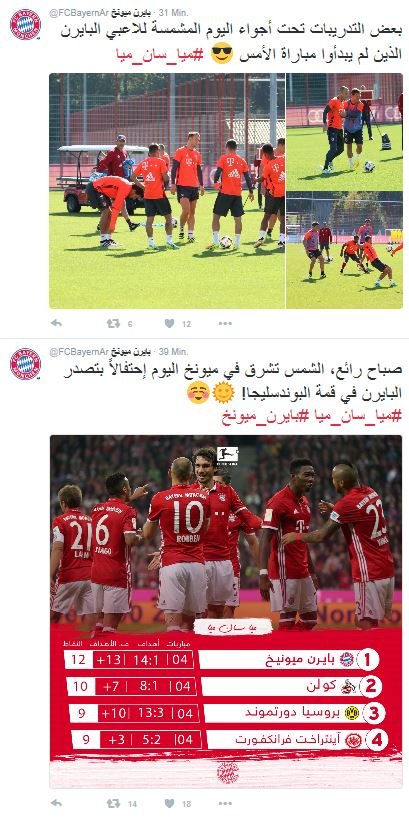
Let's move on to your digital services. It's amazing how differently things are going for FC Bayern on the website and in the networks. You recently reported 6.5 million unique visits to fcbayern.com, and most of them come from Germany.
80 percent from Germany.
That's diametrically opposed to your Facebook presence: 39 million fans worldwide, of whom only three and a half come from Germany.
Yes, but what that means for us is that we can achieve a much greater global reach through an even better international web presence. Of course, it makes sense to have fans not only on foreign platforms, but on our own website - because we can also use our partners much better there and also better integrate our own merchandising products. But even that is only the second step.
www.fcbayern.com in eight different languages
And the first?
We have to pay attention to authentic content worldwide. Our website now appears in eight different languages. After German, Bavarian is the most important for me, because this is where our loyal fans are, this is where we have our roots, and we must never, ever lose sight of that.
Nevertheless, internationalization is also important for FC Bayern. That's why, after the Chinese site, we now also have sites in Japanese, Russian and Arabic. And we quickly realized how important it is to be very authentic in the respective areas of distribution.
The content must fit the culture and the fans in the respective country - and for that it must also be produced there, i.e. locally. If you only produce a translated site, it's not the same as having your own editorial team in Shanghai, the U.S. and now also in Arabia. Then the reach goes up by leaps and bounds - because we meet user expectations better and the corresponding look and feel is also better tailored to the respective region. The content that a Chinese person sees on his computer in the morning must be completely different from what an American sees on his smartphone at lunchtime.
Own editorial offices in Shanghai and the USA
How big are these editorial offices, where do you get the staff from?
We have five editors in Shanghai, three in the U.S., and three in Arabia. These editorial teams also maintain the social media channels, which in China are different, separate networks anyway. Unlike many other big clubs, which often work with agencies, it's important to us that the editors in China, the U.S. and Arabia are also Bayern fans. That's even a hiring criterion. Only then can they convey the passion and emotion for FC Bayern that are so important to us and our fans.
We selected the editors ourselves, i.e. we didn't use recruitment agencies, they come from the fan clubs there, we found them via our social media channels.
The U.S. and China are your most important markets - in what order?
There's no difference. You can also see that in the training camps in the summer, which changes. We were in the U.S. in the first year, then in China, and most recently in the U.S. again. But new markets are also interesting. We have just extended the contract with our U.S. Managing Director Rudolf Vidal, who, in addition to the U.S., will now also increasingly work Central and South America.
What are your expectations for the still difficult market in China in particular? Sponsors from the Far East as well?
Here, too, it's only the second step. It's all about building up fans. The more fans you have there, the more likely it is that we will find new partners and, of course, our existing partners will benefit from this above all.
What we expect is steady growth, like the other big European clubs. In the last three so-called Red Card studies - they survey which soccer club has the best digital presence in China - we won twice and were second once. This shows that we are very good in China in comparison with the rest of the industry. We recently left Manchester United, Real Madrid and Barcelona behind us.
Digital transformation: FC Bayern wins Red Card study in China
It's not just about reach?
It's also about the absolute number of followers, but also about whether you have your own app and website built there, whether you have an editorial team on site, and above all about engagement: how many contacts do you have with users every day, how much is said about you on third-party networks.
Engagement as the most important parameter?
Yes, let's take Facebook: We have 39 million fans there. Real and Barca have over 90 million, Manchester United has over 70, and Chelsea is still ahead of us. But there are also many fans from previous years who are no longer active. What counts is engagement: How many people do you reach every day with your content, how intensively do they communicate with you - and in that respect we are number two worldwide behind Barcelona.
On Snapchat, FC Bayern is way out in front
Do you have an example of good engagement?
Let's take Snapchat. We were the first club to have a Snapchat live story. Bayern vs. Dortmund, last year, that was broadcast on Fox TV in the U.S., and 100,000 people tuned in. But our Snapchat live story was seen by two million people, just in the U.S.! And six million worldwide.
Which platforms do you use? Are you everywhere - and always instantly?
No. On Snapchat, we were the first, otherwise rather first followers. And we don't do everything: We're not on Tumblr, we're not on Pinterest, we think the cost-benefit factor is too low.
We have to look at where our target groups are primarily on the move. Facebook, Snapchat, YouTube, Twitter... Users are "at home" on different platforms. So we can't make the mistake of posting our content only on one particular platform and assuming that people will then go there. That's the old thinking - but it doesn't work that way anymore. People are in their pedestrian zone, where they walk around.
And we have to take our business exactly where they are. We can't be so arrogant as to believe that they'll come to us on their own. No, we have to come to them with our content.
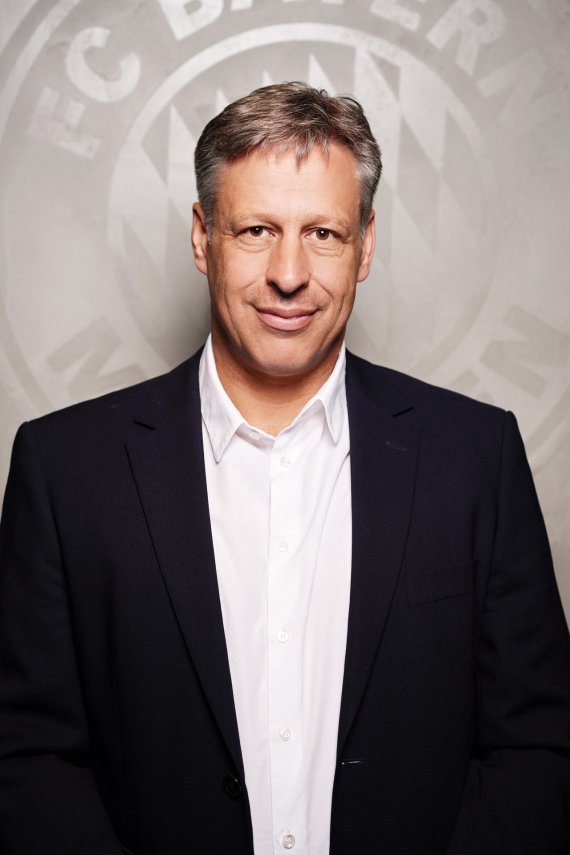
39 million fans: The club reaches the whole world via Facebook
Doesn't this content have to be exclusive?
Not necessarily. I've learned that digitization means the end of exclusivity to some extent. Of course it's good if I have certain things on my own. But I am firmly convinced: The higher the buzz, the higher the noise around the brand, around the club, so the better FC Bayern will perform on our own platforms in the end.
We have to move all the sliders up, everywhere - only then will our people find the content. The first thing is to get as many people as possible in touch with our brand, with our content. And then, in the second step, we can get them onto our own platforms - and figure out how to monetize it. That's why we've done a lot of media collaborations in China and the US. That's how our content becomes known.
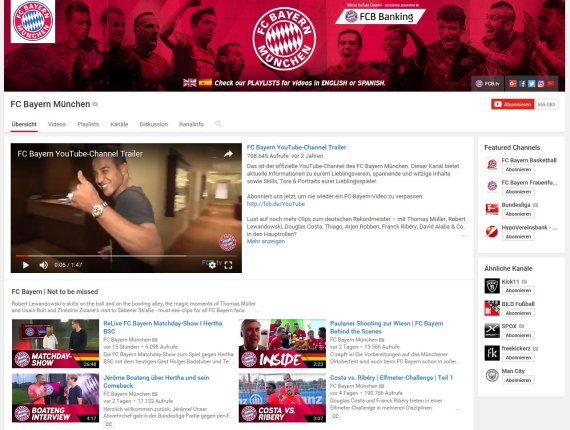
What doesn't yet work in this country is the integration of live coverage into the networks.
Not for official matches, yes. So far, no rights have been awarded to online providers because there were no adequate offers.
And because the opinion still prevails that this would cannibalize TV rights? In the U.S., people are further ahead there.
In a way, yes, I've looked at that. Take the Golden State Warriors in the NBA. A digital role model. When Stephen Curry makes a dunk, five seconds later you see a ten-second clip of that dunk on all the networks. And immediately the TV ratings go up.
In the U.S., TV broadcasters do it themselves by playing short clips of highlights live on digital platforms, and there are impressive figures to show that TV ratings go up immediately afterwards. It has long been said that digital and TV are not enemies. In Europe, this idea has yet to catch on.
Here you can find FC Bayern Munich on the web:
- Homepage: https://fcbayern.com/en
- Facebook: https://www.facebook.com/FCBayern/
- Twitter: https://twitter.com/FCBayern
- YouTube: https://www.youtube.com/user/fcbayern
- Snapchat: @FCBayernSnaps

 Sports BusinessSki Mountaineering Goes Olympic: What Milano-Cortina 2026 Means
Sports BusinessSki Mountaineering Goes Olympic: What Milano-Cortina 2026 Means
- ISPO awards
- Mountain sports
- Bike
- Design
- Retail
- Fitness
- Health
- ISPO Job Market
- ISPO Munich
- ISPO Shanghai
- Running
- Brands
- Sustainability
- Olympia
- OutDoor
- Promotion
- Sports Business
- ISPO Textrends
- Triathlon
- Water sports
- Winter sports
- eSports
- SportsTech
- OutDoor by ISPO
- Heroes
- Transformation
- Sport Fashion
- Urban Culture
- Challenges of a CEO
- Trade fairs
- Sports
- Find the Balance
- Product reviews
- Newsletter Exclusive Area
- Magazine





